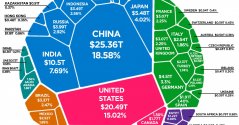GDP unfairly favors non-value added transactions, while energy consumption unfairly favors heavy industry.
Ground truth is somewhere in between.
Imo it's just hair splitting going back and forth arguing whether China leads econonically by 20% or by 2x. When the more impactful factor is that raw economy size alone does not finish great power contests. US can still be a threat through things not measured economically, by having a much more mobilized society, having undermined international organizations, having geographic proximity through bases in some hot zones etc.
For example, US still has indirect control over much of global oil production, this might not help them reach China in GDP, but it makes them a real threat towards China's partners in the third world.
US is dangerous nearly never because of economical reasons, but because China has allowed them in the past to unfetteredly corrupt the UN, build up their military and collect colonies from weak countries. With these tools, US still represents a threat to Chinese security, despite their diminished home economy. It is misleading to brag how much larger the CN economy is, when it's not the most crucial battlefield anymore. Who really cares how much more electricity we can consume/make, more cars we can build or more valued transactions happen yearly, if these economic advantages are not used to directly curtail American influence?
You are wrong. Shareholders add a lot of value to the real economy.

